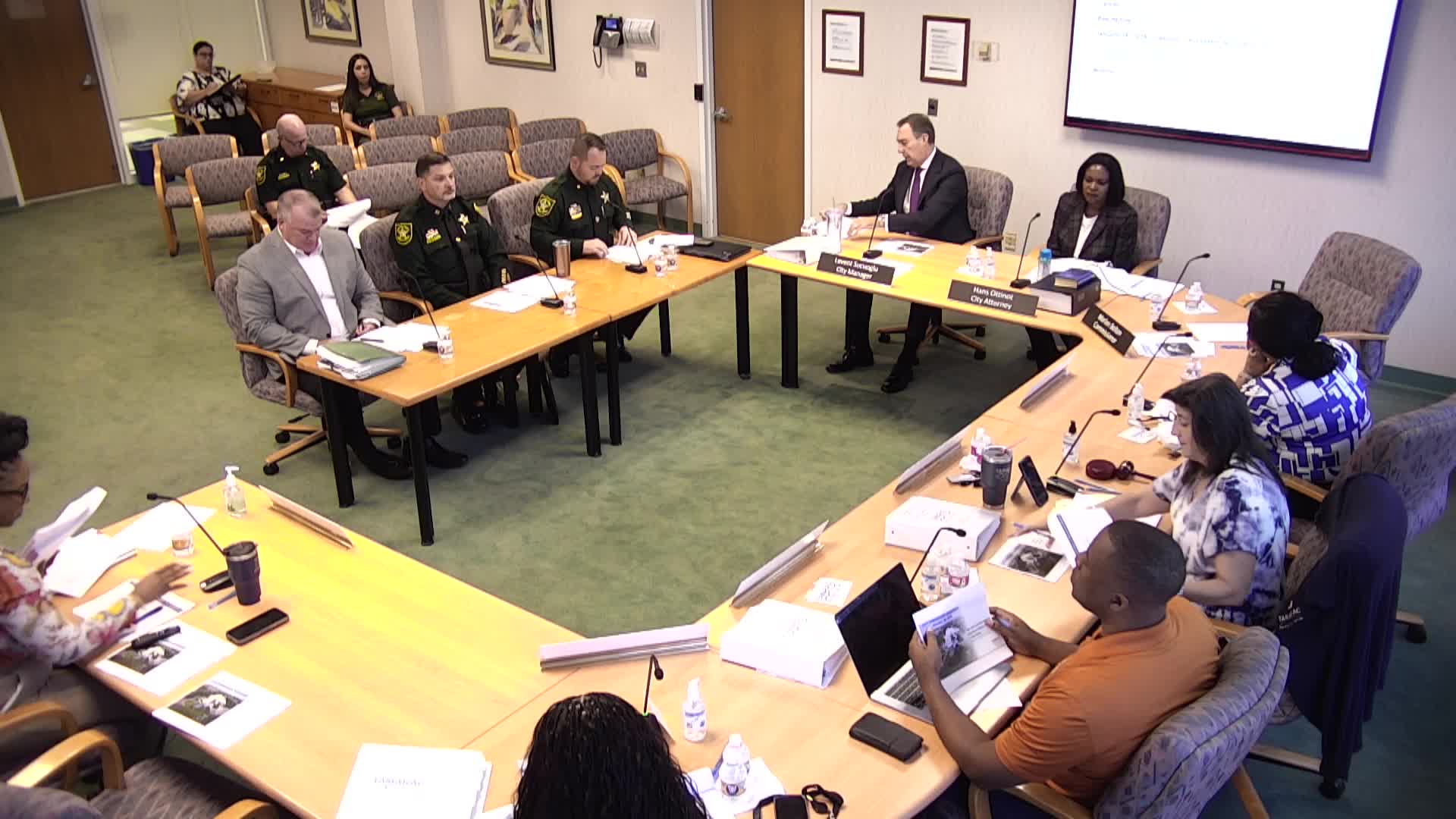Tamarac staff and Broward Sheriff's Office present proposed five-year policing contract emphasizing patrol visibility, new community deployment team and tighter
Get AI-powered insights, summaries, and transcripts
Subscribe
Summary
City Manager Levents Sajulu and Broward Sheriff's Office leaders presented a proposed five-year contract that would refocus minimum staffing on uniform road patrol, expand neighborhood-facing deputies and add reporting requirements.
City Manager Levents Sajulu and Broward Sheriff's Office leaders presented a proposed five-year contract for police services at a Tamarac commission workshop Tuesday, describing a reorganization of patrol staffing, new community-focused positions and added reporting and transparency requirements. The proposed agreement would, if approved by the commission, take effect Oct. 1 and run five years with one renewable option.
Sajulu said the current contract lapsed Sept. 30, and the new proposal is built around a 12-hour shift model and a clearer definition of minimum staffing. Under the proposal the city’s service would be based on 110 personnel overall (about $24,000,000 annual cost cited by staff), including 92 sworn officers. The new minimum-staffing definition focuses on road patrol: “10 uniform deputies plus 1 uniform public patrol sergeant per 12 hour shift,” Sajulu said. Staff described that change as a reallocation rather than a net hiring increase; of the sworn complement, 56 deputies would be dedicated to road patrol, yielding about 14 road-patrol deputies per 12-hour shift when fully staffed.
Public safety consultants and BSO leadership said the contract emphasizes visibility, neighborhood engagement and traffic enforcement. Chief Juriga, the city’s public safety consultant, said the renewal seeks to “increase visibility, enhance community engagement, and also enhance traffic safety,” and flagged communication and accountability as priorities.
Major Christy Giovani, speaking for the Broward Sheriff’s Office, said the agreement memorializes changes BSO and the city already discussed. “We saw a lot of area for just enhanced services with utilizing and reimagining the services that you already have entrusted to us,” he told commissioners, adding that the proposed structure reflects shared recommendations between city staff and BSO leadership.
Captain David Franks, the proposed district chief for Tamarac, described a new community deployment team that expands the city-facing community policing footprint. Franks said the team will grow from two deputies to six and be trained for multiple roles, including bicycle patrol, homelessness outreach (HOTT certification) and CPTED (crime prevention through environmental design) assessments. “I called them the Swiss Army knife of the district,” Franks said, describing the team as an “actionable” unit that will be deployed to quality-of-life problems, business outreach and smaller city events.
The proposal also includes a dedicated traffic deputy in an unmarked vehicle, expanded traffic enforcement tied to road-patrol reallocation, and more explicit use of on-duty district staffing for many city events—an attempt to reduce reliance on paid special details when feasible.
Financial and accountability provisions discussed at the workshop included: a first-year cost increase tied to a Broward Sheriff’s Office class-and-comp study (Sajulu cited an 11.9% projected increase in year two in the presentation); a 5% cap in later contract years; quarterly vacancy credits to the city when positions are unfilled; and a parity (most-favored-nation) clause that would let Tamarac benefit from more favorable terms if other municipalities negotiate better deals.
Commissioners asked for concrete measures to evaluate whether the changes increase visibility and reduce response times. Staff said the contract adds clearer, more frequent reporting (weekly staffing reports rather than quarterly), regular manager–district chief meetings, and quarterly performance reviews tied to the contract’s exhibits. The contract also includes a section formalizing communications between city and BSO about public information and joint event outreach.
Several commissioners pressed BSO leadership about how minimum staffing will be measured in practice, how vacancy credits will be calculated when deputies are off (sick, training, leave), and how the city will monitor continuity of assigned personnel. Major Giovani and Captain Franks described overtime and reassignment mechanisms the sheriff’s office would use to maintain the 10-deputy minimum during short-term absences and noted monthly and weekly reporting improvements.
The item was presented as a proposal; the city manager said the contract is scheduled for formal consideration at the Tamarac commission meeting on Wednesday, Oct. 22. Commissioners and BSO leadership agreed on the importance of ongoing oversight and pledged continued weekly and quarterly coordination if the commission approves the agreement.
